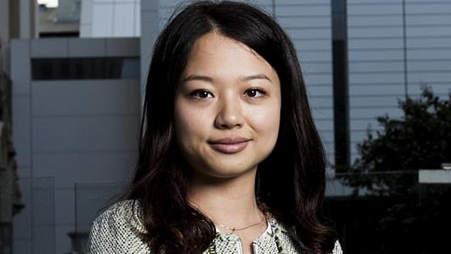Cashed-up Chinese students turn to Australia

Qing Qing outside St Barnabas church in Sydney’s Ultimo … ‘there’s this thinking that if you have the money and the chance to go to Australia, then you should’.
Fashion designer and student Qing Qing has her heart set on permanent residency in Australia. But that didn’t stop her delaying her departure date three times when it came to leaving her home in the wealthy industrial city of Hangzhou, an hour south of Shanghai.
“I was going to miss everything, my parents, my friends, my dogs . . . I just didn’t want to get on the plane,” the University of NSW student says. “But there’s this thinking that if you have the money and the chance to go to Australia, then you should.”
Qing Qing is one of the 88,000 Chinese students enrolled in Australian universities, leading the most influential migratory wave to hit Australia since the country was remade by southern Europeans after World War II. She struggles with her English, she enjoys going to church and she spends her weekends in Sydney having dinner at World Square or Chinatown and dancing with friends at bars in Darling Harbour.
But that is where the parallels between Qing Qing’s life and that of the typical university student end. Hers is not made up of cramped inner-city hovels subsisting on cups of two-minute noodles. She has Chanel in her wardrobe. She drives a late-model Mini Countryman, a smart four-wheel-drive made by luxury car maker BMW under the Mini marque. She owns a two-bedroom apartment in the inner suburb of Zetland and another off-the-plan apartment under construction in the waterfront suburb of Wentworth Point near Homebush in Sydney’s west. Qing Qing has work experience under her belt, but her parents have also helped finance the move.
It’s a lifestyle that agents, immigration lawyers and migration consultants say is becoming more common among young Chinese students.
The Department of Immigration is unable to release information revealing the average net wealth of Chinese immigrants on arrival. But members of the Chinese community say Australia is becoming a more attractive destination for the middle class. And there are many reasons, they say. One is to do with scholarships and financial aid: Australia, with many fewer enticements, is more popular for those who can pay their own way; the United States is more attractive for the cash-strapped.
“You know from the start that you are going to have to pay for yourself, you can’t rely on scholarships or anything like that which they have in America,” MBA graduate Li Shen says.
Geographical proximity
Others say the proximity of Australia to China appeals to migrants with business interests back home who want to have the lifestyle benefits of living in a Western city. “There’s an idea that both [the] parents’ business and children can benefit from the arrangement [of living here],” Melbourne-based immigration lawyer Lily Ong says.
Compass Global Markets chief executive Andrew Su says many of his clients choose Australia for the time zone, which makes it relatively easy to keep a handle on business in one country while living in the other. A Vietnamese immigrant, Su has worked behind the scenes procuring funding on some of Australia’s biggest residential transactions, and plays a central role in helping finance ventures in Australia for offshore professionals.
Ong has had clients who have given up permanent residency in Canada in favour of setting up in Australia for the same reason. That proximity, coupled with the country’s internationally recognised universities and established international student programs, means Australia offers a compelling destination for China’s middle class, she says.
“These factors added together help Chinese family’s decide to send their children here,” Ong says.
Master’s graduate Li Shen cites concerns about the air quality and food safety in the People’s Republic, but lists other attributes that make Australia attractive to young Chinese professionals. Shen recently graduated with a master’s of business administration from the University of NSW, and is now looking for a job here to add to her CV, which already includes marketing manager roles in China, with Siemens and Symantec.
Originally from Guilin in China’s south, Shen lives on Sydney’s north shore with her husband, who works in finance and risk management and has held roles in Australia with Westpac and Macquarie Group.
“My old bosses at Siemens [in China] were from Germany and America, and it made me want to look outside and to see what another part of the world looked like,” she says. “And America is too far away from the Chinese market.”
Straight into the property market
Shen says many Chinese professionals understand that some work practices in China may not be the norm in other countries, and it makes international experience crucial.
A rising wave of mergers and acquisition activity in China has also prompted the computer science graduate to learn finance skills. While a young employee at Siemens, Shen watched French group Atos acquire Siemens’s IT arm in 2011 for almost €430 million ($631 million). “I see a lot of M&A going on – not just within China, but in other countries as well – but a lot of Chinese companies are [at the centre of these deals] . . . and I thought, ‘I have the tech background, why don’t I learn some finance and do these things for them?’ ” Like Qing Qing, Li Shen and her husband wasted no time jumping into the property market, buying a three-bedroom apartment behind Melbourne’s Central Station off the plan within a couple of months of arriving.
Their buying plans in Sydney were more considered. They wanted to make the city their home, but they also had some concerns about the stability of property prices.
“We didn’t want to buy anything off the plan. There’s some risk in Sydney with these sorts of properties because there’s so much more supply coming on stream,” she says.
The couple are now looking for a third property which could in time become a family home, not just for the children but for their parents, too. Chinese students buy about 15 per cent of every Sydney inner-city apartment development handled by CBRE residential head David Milton. But his best customers, he says, are Chinese parents. “Most buyers come from China because their children study here,” he says.
“That’s probably our biggest market for inner-city apartments.”
Melbourne’s property market has also felt the effects of stronger interest from Chinese students and their families. “Melbourne historically has had strong demand from international investors,” Oliver Hume residential director Jamie Kay says.
“Most notably, it originally came from Singapore and the Malaysians, but the Chinese market – in the sense of a huge increase in buyers – has really opened up in the past three and four years. They’ve been driven by a desire for education, but they’re also after residency. They want an Australian lifestyle, they like Australian governance and sovereignty, and they also like Australian property fundamentals.”
It’s clear Li Shen feels uncomfortable talking about her property holdings.“I know this is really Chinese behaviour,” she says with a nervous laugh as she shifts in her seat. “Maybe I can explain why we decided to buy it? We trust the Australian system, we know the developer is going to stay there and they won’t run away,” she says. “When Chinese people buy something offshore, even if they never see it, they trust the Australian credit system.”
Are developers in China hard to trust?
“We have to check their reputation first. Maybe if they’re a large company, it’s OK, but if it’s a small one, then maybe no – to be very frank.”
Looking for a better lifestyle
Compass’s Su says such cases are common: “It’s not like they’re selling out of China and disposing of things left, right and centre, it’s a process of diversification. They will continue to build their businesses in China, but they’re also looking for better health and education standards in Australia,” he says.
I meet Su for the first time on a cold Monday evening in autumn over dinner at Waitan, a lavish restaurant known for its wine list and which features a $50,000 bottle of cognac. It is popular among Sydney’s Chinese bright young things.
Monday is a typically quiet night for restaurants, but Waitan’s dining room was near full and humming with steady chatter, its dark mahogany tables surrounded by the young members of the Chinese community, the men in Zegna suits, the women sporting the latest Chloe or Chanel handbags.
Groups of friends in their 20s and early 30s hover in clusters at each other’s tables, often getting up to chat as new diners, also friends, arrive throughout the evening.
Two prominent real estate agents acknowledge one another politely as they make their way to separate tables, while Jason Lin, a young project marketing director, who has led international marketing campaigns for large-scale residential developments by the likes of Crown Group and Chinese developer Country Garden, steadily works his way around the room.
In the corner, a dozen or so senior executives and board members of Hong Kong-based television network TVB-A sit at a round table, locked in conversation.
Upstairs, most of the restaurant’s 14 private dining rooms are booked out by companies entertaining clients with karaoke in between plates of Waitan’s signature Peking duck and glasses of Chinese wine.
Owner and property developer Patrick Tian arrived in Australia in 2000 as a student. The son of Tian Junting, China’s then consul-general to Australia, who was based first in Perth and then Melbourne, he changed his given name to the more easily pronounced “Patrick” on arrival. He studied business in Perth and went about setting himself up without the support network he says international students now enjoy.
Community support
“Kids arriving here today have it a lot easier than 15 or 20 years ago,” he says.
Tian reckons the Chinese community has reached a critical mass, allowing more migrants to help one another. Each of the students interviewed agree. They have all benefited from strong support networks in Australia – from the day they arrived, they say, whether cousins, family friends, church or university groups. They also say there is a trend to keep their Chinese name, rather than assume an English version.
“It was a different world back then, but young Chinese can easily find their way now,” Tian says.
But the transition can be rocky. For some students, opportunities in Australia are laden with big pressures.
Qing Qing admits to feeling stressed and regularly sees a free counsellor at university to talk about her fears that her application for permanent residency will not be successful.
“I have a job now so I’m worried whether I can do the job well, and I also worry whether I can stay here eventually,” she says. Qing Qing’s father has no desire to move to Australia. Pollution levels don’t concern him, he is dismissive about fears of food contamination and is too attached to his property development business in Hangzhou to run it at arm’s length. But her mother has her heart set on a new life in Australia.
“My mum’s wish is to come here, so I think [residency] is not only for me but it’s for my parents as well,” she says.
For many, the pressure is financial.
Waitan marketing manager and communications graduate Amy Xu is not yet 25 but is already responsible for paying the lion’s share of the mortgage on her parents’ apartment above Rockdale Plaza in Sydney’s south, and another two-bedder in Hurstville.
She works days and most nights promoting the restaurant and liaising with its guests, while doing work for National Australia Bank at large events where they require a Mandarin-speaking MC.
Xu studied a communications degree at Sydney’s Macquarie University, during which time she shared a three-bedroom house with six others. Things were tight, she says, and she found it hard to manage her study load with her 40-hour-a-week job.
But it wasn’t as difficult as it was for one of her flatmates. “He lived on one sushi roll a day,” she says. “That was all he could afford.”
She now works more than 60 hours a week to support herself, in addition to stumping up the $500 she needs for the family’s weekly mortgage repayments.
In China, her father was a psychiatrist and her mother worked in health research for international pharmaceutical companies. But lack of English has meant they have been factory workers since emigrating in 1999.
“It’s been difficult for them, but they think it’s worth it,” Xu says in her broad Australian accent. “I graduated school here. I went to university and now I’ve got a good job and I can earn money to buy a home and to take care of my parents.
“And besides,” she adds, “they would never dream of going back.”
BMW Sydney corporate manager Tony Wakefield knows first-hand what life looks like for the more fortunate. He estimates that young Chinese students and professionals in the early stages of their career make up about one-third of would-be buyers coming into the showroom.
‘A choice of seven sports cars’
“The kids I see all work incredibly hard, but their parents are also incredibly generous and will do a lot to make sure their children are safe, and are being looked after,” he says. “My customers are hard-working professionals who have made a lot of money. Their attitude is that why shouldn’t their kids live the same way their parents do?”
“But I ask them what marks the kids get at university, and they are always very high.”
Even within the seriously well-heeled ranks, there are obvious differences between those who simply have, and those who have everything.
Su has clients whose children will pick from a choice of seven sports cars sitting in the garage. “And I’ve also got other clients who spend more than $20,000 a night at Marquee at The Star [casino],” he says.
But even within a community in which cash and labels reign supreme, there are limits. “These kids know what it looks like to be driving these cars, and to be spending the amount they do. But they know their parents wouldn’t be impressed, and for that reason they don’t want to talk about it.”
Despite repeated invitations, the super high-net-worth Chinese students all refused to be interviewed. “Of course they’re not going to talk to you,” one Shanghai-based reporter says. “This is the worst possible time for a Chinese person anywhere in the world to show they have any wealth.”
The public displays of wealth have riled older members of Australia’s Chinese community, many of whom arrived as refugees after the Tiananmen Square massacre.
“All the bad culture is being brought from China to here,” said one former student, who arrived in 1989. “[The 1989 arrivals] have become the minority.”
Blatant displays of wealth
Chinese-born Sydneysider Michael Zhong, who also arrived in 1989, is concerned that China’s reform agenda is weakening as streams of bright and wealthy young people emigrate to Australia for good.
“Many people, after they get permanent residency, just forget [about China] and don’t care,” he says.
In some pockets of Sydney and Melbourne, the parade continues.
Li Shen and Qing Qing often find themselves rolling their eyes at the blatant displays of wealth common among some of their friends and fellow students.
“I have some friends who pose on Instagram and say things like, ‘I have a new bag’, but I don’t want to be like that,” Qing Qing says. “I used to like labels. I used to wear Louis Vuitton, Miu Miu . . . but I’m not like that any more.
“I got to a point where I didn’t want other people to think, ‘You have lots of money, you can buy this, you can buy that.’ ”
The trend towards designer labels is more common in Shanghai and Beijing, and the cities close by, says Li Shen.
The cultish devotion to labels is inspired partly by a reverence for Western pop culture and films, she says. Equally, it traces to the millennials from Korea, Taiwan, Japan and Hong Kong, where wealth was accumulated at the same breakneck speed as in China, only earlier.
Li Shen and her husband drive a Corolla, although they could afford a Mercedes or BMW, and designer clothes – if they wanted them.
“My bag is from [US high-street label] Forever New, and I think my dress cost about $50. Spending lots of money on things like clothes and cars just isn’t important to us,” Li Shen says. “We’d prefer to spend our money on nice wine, or a trip to New Zealand. I suppose we’re a bit Australian in that way.”
Buoyed by work opportunities
The couple haven’t yet decided whether they will settle in Australia. They are open to stints in Hong Kong and Singapore, but they are buoyed by the work opportunities here.
Shen points to BHP Billiton executive Michael Henry as an example of someone from a Chinese background who climbed to the top ranks of an Australian listed company. Telstra international president Tim Chen is another.
It’s inspiring, she says. “Some Chinese students studying in Australia will say, ‘We cannot get involved in the local society, we’re finding it difficult to get a good job; we just live at the bottom’, but I know people who have really successful careers here.
“If you prove that you are really passionate about something, you can do a great a job here. Australia’s the type of place where that can happen.”
What about America?
“America has plenty of opportunities, but there are so many talented people over there. It’s like you’re not the only one working hard. Everyone worked hard over there, everyone has brilliant ideas, and sometimes you have to rely on some relationships.
“But Australians are quite laid-back and there’s more of an equal opportunity.”
The Australian Financial Review
PUBLISHED: 07 Jun 2014 02:43:00 | UPDATED: 09 Jun 2014 05:27:34 Samantha Hutchinson
http://www.afr.com/p/national/arts_saleroom/cashed_up_chinese_students_turn_8ajUMJNOwsgpN4f2FRwQCO








